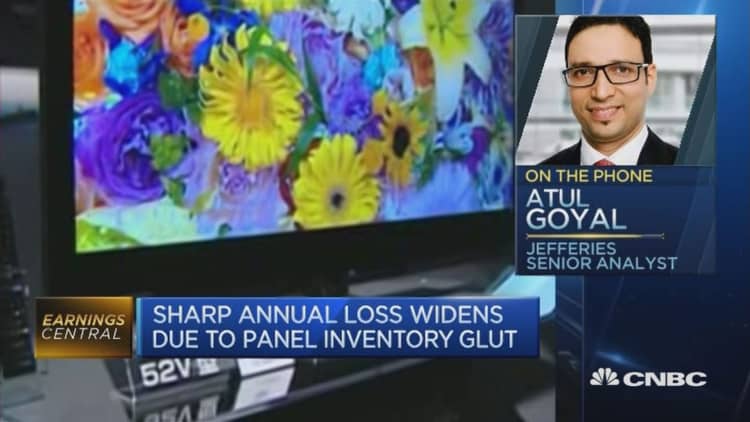
Sharp, one of Japan's oldest consumer brands, "needs a miracle" to recover from its current struggles, global investment banking firm Jefferies said on Friday.
Operating losses more than tripled to $1.5 billion for the fiscal year that ended in March, the Osaka-based firm reported on Thursday, blaming sliding demand for its liquid crystal display (LCD) panels, with sales of LCD televisions slumping an annual 23 percent during the year.
Taiwan's Hon Hai Precision or Foxconn, which paid $3.5 billion for a 66 percent stake in Sharp earlier this month, said job losses were on the cards in order to bolster efficiency and turn around the ailing firm. Sharp shares rallied 6 percent in early Friday trade following the news, while Foxconn shares rose more than 2 percent.
But Atul Goyal, senior analyst at Jefferies, said investors shouldn't get too carried away.
"I'm not too optimistic about Sharp. It's not just about their LCD panels, the problem is they have a lot of other consumer electronics businesses where Sharp is seeing 20-30 percent declines," he told CNBC.
Indeed, every main consumer product excluding camera models, recorded annual sales declines during the past fiscal year, with mobile phones down 24 percent, reflecting the saturated state of the global smartphone market.
"Sharp's financial distress isn't hidden from its customers. We believe the loss of reputation will result in continued loss of market share," Goyal said.
Foxconn CEO Terry Gou named Tai Jeng-wu, currently Foxconn vice chairman, as Sharp's new president on Thursday, which would make Tai the first ever foreigner to lead the 104-year old company. Critics of Japan Inc have long recommended the inclusion of more foreigners in the workforce to combat the country's aging population and breathe fresh life into traditional corporate culture.
Sharp is trying to diversify its revenues by entering the Organic Light Emitting Diode (OLED) market but it may be "too little, too late," Goyal noted.
Last month, the firm pledged to invest $2 billion in OLED display manufacturing over the next four years but Goyal noted that rivals such as Samsung are already well-ahead in that sector.
The South Korean conglomerate commands around 95 percent market share in the mobile OLED panel market, according to local media reports, and its leadership will likely remain cemented following reports that it secured a contract from Apple to make OLED displays for future iPhones.

